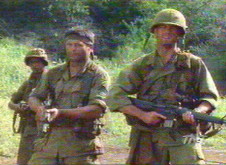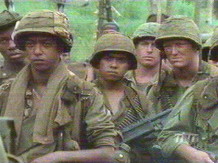 |
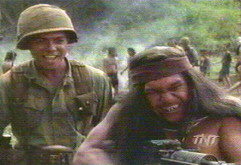 |
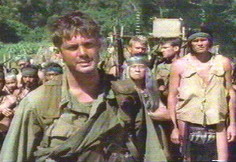
By Lee Russell
 |
 |

The aboriginal Montagnards were the original inhabitants of the Vietnam. They
bore EXACTLY the same relationship to the Vietnamese as the American Indians
did to the Western settlers in 19th Century America. Over the years, their
tribal groups had been driven to the country's remote Western mountains.
"Montagnard" is the French word for "mountaineer." The Vietnamese, both North
and South, despised them. Their word for them was "moi" which means
"savages." During the Indochina War, the French had organized many of the
tribes to fight the Viet Minh. After their victory, the Viet Minh
exterminated those that had opposed them in North Vietnam. In the South,
where they were not even citizens, the Montagnards retreated to their
mountains and tried to stay neutral. Unhappily the Ho Chi Minh Trail ran
though the same mountains and neutrality was no longer possible. Against the
wishes of the South Vietnamese government, the US Army Special Forces began
arming and training the Montagnards in the late 1950s. As they had done
before, with the French, the tribesmen welcomed the US advisors. The Green
Berets became honorary members of their tribes. They learned the languages,
participated in ceremonies, ate local food and wore tribal dress, such as the
brass friendship bracelets, with their military uniforms. Kithem is
apparently from this period. The Viet Cong, of course, were doing the same
with THEIR tribes.
The Army PAO did not like this script, not because of the scenario (in
reality a contact with a "new" tribe would be turned over to the Special
Forces) but because of the depiction of the South Vietnamese troops. Tour of
Duty generally depicted the South Vietnamese armed forces in a good light.
This show would be an exception. The Army of the Republic of Viet-Nam (ARVN)
had their own Special Forces, patterned on the US Green Berets, who were
supposed to work with the Montagnards. They weren't very effective. Their
hearts weren't in it. (Hanging out with the "moi"? No way!) Sarcastic
Americans said their unit abbreviation, LLDB, stood for "Look Long, Duck
Back." The Army PAO objected to this characterization in the script but it
was correct for the period and stood. Besides their regular troops, the
Saigon Government had several types of local militias and paramilitary
forces. The ones we show in the episode are the personal troops of the local
District Chief, called "Popular Forces." In US terms, think of them as the
Sheriff's Posse of a US County. Some of these forces were quite efficient,
others less so. It all depended on the District Chief. This Chief is corrupt
and overbearing and his PF unit reflects this. The Popular Forces made do
with bits and pieces of regular uniforms and civilian clothes. They looked a
lot like the Viet Cong, and were distinguished from them by their unit
patches worn on their shirts. The designs could be complicated or simple. I
designed the patch for the episode. It features an ordinary house cat! This
is not as silly as it sounds. The superstitious Vietnamese regarded animals
that hunted at night (like bats and owls) as possible "familiars" for ghosts
and evil spirits. A cat might also be regarded as a harbinger of death, in
the Vietnamese mythos.
I was also thinning out my collection of "tiger stripe" camoflage uniforms
and the show's costumers, Hollywood Raggs bought my extras, most of which
appear in this episode.
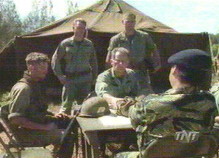 |
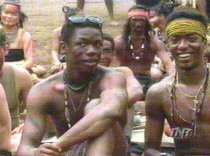 |
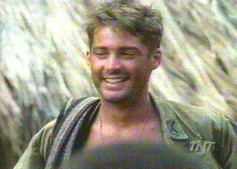
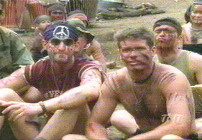 |
|
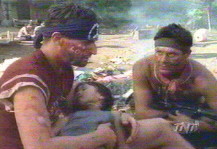
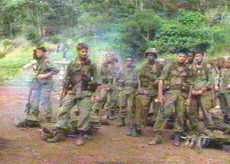 |
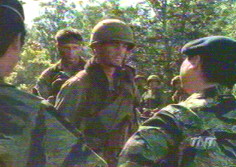 |
